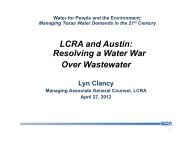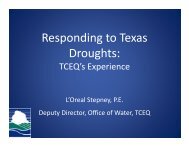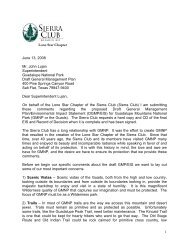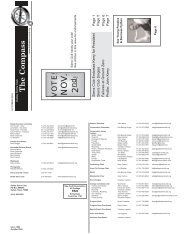Fall 2002 - Lone Star Chapter, Sierra Club
Fall 2002 - Lone Star Chapter, Sierra Club
Fall 2002 - Lone Star Chapter, Sierra Club
Create successful ePaper yourself
Turn your PDF publications into a flip-book with our unique Google optimized e-Paper software.
New Economic Study<br />
Places Value of Recreation<br />
and Restoration on<br />
Texas’ National Forests<br />
Above Commercial Logging<br />
Report Shows Taxpayer Loss<br />
from Federal Logging Program<br />
<strong>Lone</strong> <strong>Star</strong> <strong>Sierra</strong>n <strong>Fall</strong> <strong>2002</strong> 15<br />
Your Environment<br />
A new report released in August<br />
by the Ecology and Law Institute<br />
(ELI) and the <strong>Sierra</strong> <strong>Club</strong> finds<br />
that the logging program on Texas’<br />
national forests lost tens of millions<br />
of dollars between 1987-<br />
1999, and may in fact have created<br />
no new jobs during that time<br />
period. The National Forests in<br />
Texas: An Economic Case for Restoring<br />
Our Natural Treasures, which is<br />
based on a recent study by ELI,<br />
looks at the damage, both economic<br />
and environmental, from<br />
the commercial logging program<br />
on Texas’ four national forests and<br />
debunks the longstanding belief<br />
that East Texas economies depend<br />
on commercial logging on national<br />
forests.<br />
Some of the best hiking, hunting,<br />
camping and fishing in Texas<br />
occurs within our national forests.<br />
Houston’s clean water found in<br />
Lake Conroe, Lake Houston and<br />
Lake Livingston comes from these<br />
forests. Yet when logging roads are<br />
built and our national forests are<br />
spoiled, rain washes topsoil into<br />
our waterways.<br />
Revaluating Forest<br />
Economics<br />
For years, the U.S. Forest<br />
Service, using an accounting<br />
system recently criticized by the<br />
General Accounting Office (the<br />
investigative arm of Congress) and<br />
scrapped, claims that commercial<br />
logging on Texas’ national forests<br />
was good for the local economy.<br />
The new analysis completed by<br />
independent economists finds that<br />
the Forest Service in Texas keeps<br />
many significant costs, like<br />
prescribed burning and road<br />
removal, off its books. The Forest<br />
Service’s inaccurate accounting<br />
has inflated the value of building<br />
roads and selling timber from our<br />
national forests, and has undervalued<br />
the contribution recreation<br />
and clean water make to local<br />
communities, if those values are<br />
considered at all.<br />
“When logging roads are abandoned<br />
on the Sam Houston National<br />
Forest after an area is<br />
logged they become an erosion<br />
problem,,” said Ron Warner of<br />
Texas Black Bass Unlimited and<br />
owner of April Plaza Marina on<br />
Lake Conroe. “National forest land<br />
should be preserved, but when<br />
torrential rains wash soil from the<br />
neglected roads into the lake, the<br />
lake becomes contaminated with<br />
pesticides and oil, gas, and grease<br />
left behind from logging operations.<br />
My income is definitely<br />
affected when water quality drops<br />
and people don’t want to come<br />
here to fish, swim or ski.”<br />
Re-examining<br />
Subsidized Logging<br />
The report illustrates how,<br />
between 1988-2000, timber production<br />
in the state remained<br />
virtually constant while logging<br />
levels on national forests plummeted<br />
during that period. The vast<br />
majority of timber production in<br />
the region shifted to private lands.<br />
“The only reason logging exists on<br />
Texas’ national forests is because<br />
taxpayers subsidize it,” said<br />
Brandt Mannchen, Forestry Chair<br />
for the Houston <strong>Sierra</strong> <strong>Club</strong>.<br />
“Private woodlot owners can meet<br />
our timber production needs and<br />
shouldn’t have to compete with<br />
low-cost lumber propped up by<br />
federal subsidies.”<br />
The report is designed to help<br />
policy makers, community leaders,<br />
land managers, and the public<br />
identify what money is being<br />
wasted logging Texas’ national<br />
forests and to understand the<br />
fiscal responsibility in conserving<br />
recreation opportunities and clean<br />
water for future generations of<br />
Texans to enjoy. Protecting what<br />
intact forests remain on Texas’<br />
national forests and shifting the<br />
Forest Service’s emphasis from<br />
timber production to restoration<br />
and recreation will leave our<br />
children a natural legacy of which<br />
we can be proud.<br />
For More Information<br />
To view the full report, go to:<br />
http://<br />
www.forestconservation.org/<br />
PublicationsandReports/pubs.htm.<br />
For more information, contact<br />
John Talberth of Ecology and Law<br />
Institute, 505-986-1163, or the<br />
Texas-Arkansas Field Office,<br />
512-472-9094.







